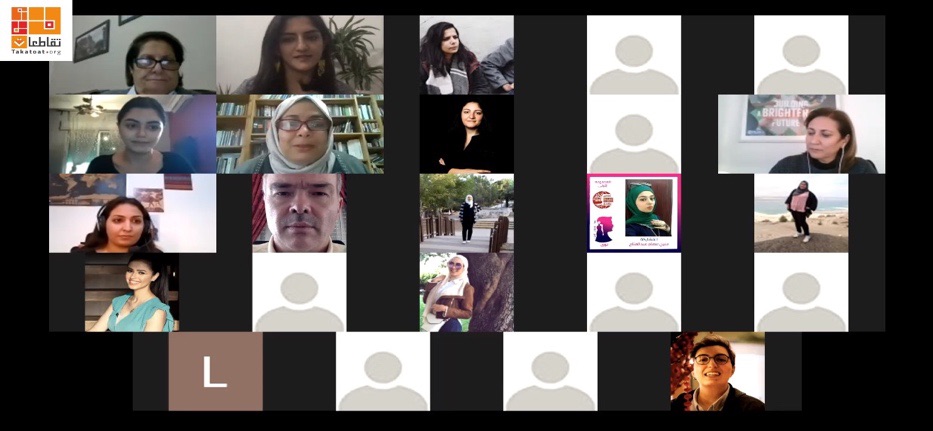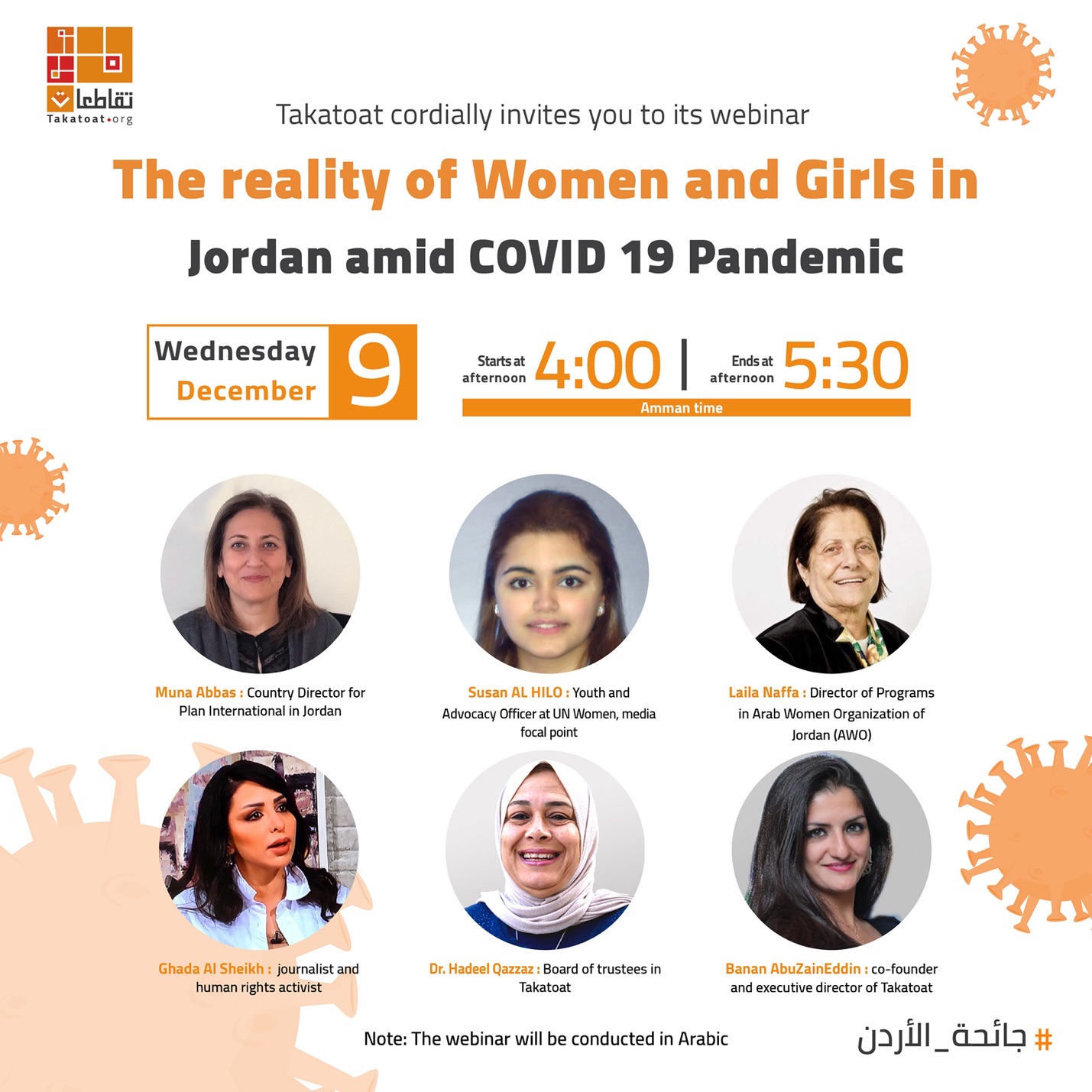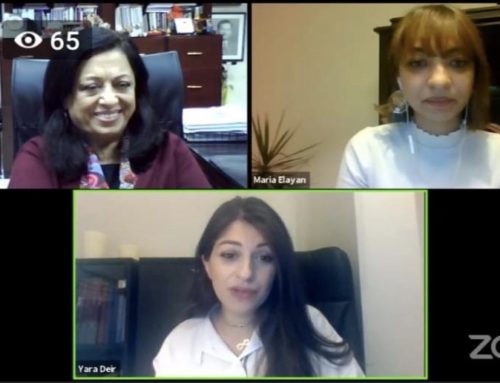Takatoat- In Jordan and across the world, the COVID-19 pandemic has been a major setback in the struggle against gender based violence and discrimination. Feminist activists and women’s rights experts shed light on that setback and its repercussions during an online discussion hosted by Takatoat, where the reality of girls and women amid the COVID-19 pandemic in Jordan was explored.
The online discussion was kicked-off with an introduction to Takatoat’s work including the recently published report under the same topic. The report, authored by journalist Ghada al sheikh, addresses how the pandemic affected women in Jordan with an intersectional lens, analyzing the experiences of women who face multi-layered forms of discrimination in Jordan, such as refugees and migrant workers.
The Cycle of Violence against Women
Among the speakers was Muna Abbas, Jordan’s country director at Plan International. Ms. Abbas explains during her intervention how the cycle of violence against women and girls starts at a young age through discriminatory education practices and inequal access to opportunities. She expressed how what she calls an “early subjugation” has led women and girls to isolation, even before the pandemic.
According to Ms. Abbas this pre-existing isolation was only intensified by the pandemic. Referring to a study prepared by Plan International, she discusses how the intense isolation, especially during the lockdown period, had deprived women of any outside source of protection or leisure. A gender gap in the access to social media and online information also exists as the number of males who own smart devices is double that of their female peers in Jordan. When women and girls do access the internet, they are met with censorship, restrictions, harassment and bullying. These are all factors that have perpetuated the oppression of girls and women in Jordan.
Protection Mechanisms in Crisis
The Director of Programmes of the Arab Women Organization of Jordan, Laila Naffa, confirmed that during the lockdown period, the mental support cadres of the organization had been exhausted beyond their capacity in providing support for survivors of domestic violence. She noted that women’s rights organizations in Jordan had lost contact with officials during that period. And that up to this moment, there have been no real connection between women’s rights organizations and official authorities to provide protection for survivors of domestic violence in addition to no stable methods of reaching those women under different circumstances.
Moreover, despite calls from women’s rights organizations to open health care centers that provide contraception for women, the centers remained closed during the lockdown period. On the other hand, demands for opening children’s vaccination centers were met. As Ms. Nafa puts it, “this revealed that the lack of women in crisis management positions had deprived women of their essential needs and rights during the period of lockdown.”
Ms. Naffa mentioned that those working in the informal sectors, such as farmers, are facing harsh economic circumstances. Noting that women make up 48% of informal workers in the country who are being deprived of financial aid during lockdown periods, with no protection or assistance being provided for them they are unable to join the Social Security Corporation.
A Widening Gender Gap
Susan al Hilo, Youth and Advocacy Officer at UN Women in Jordan reviewed during the session figures that revealed a widening gender gap in Jordan, which ranked 138th out of 153 countries in the World Gender Gap Index for 2020. In terms of decision-making positions, there was a clear decline in the presence of women in the parliament this year, representing 15 seats only, all within the quota. Combined with a decline of positions filled by women in the government and the senate.
A new form of gender inequality, according to Ms. Al-Hilo, has risen to the surface during the pandemic, namely the digital gender gap, where males have greater access to technologies and online information and services. Moreover, a study conducted by the UN revealed that 62% of women in Jordan feel a growing risk of physical and mental abuse due to an absence of security during the pandemic.
Journalist and human rights defender Ghada Al-Sheikh spoke about the constraints she faced preparing Takatoat’s report on the reality of women in Jordan during the pandemic. The most prominent of which being the withholding of information relating to the rates of violence inflicted on women during lockdown by officials, and the number of complaints received by the Family Protection Department. Not to mention the many forms of restrictions on the media such as banning all content related to the murder of a 14-year-old girl at the hands of her brother after she created a Facebook account during lockdown period.
Figures shown in reports by women’s rights organizations in Jordan have revealed a frightening rise in domestic violence rates against girls and women. According to reports by Sisterhood Is Global Institute Jordan (SIGI), more than 800 cases of domestic violence against women have been reported in the span of two months only, during the lockdown period. Compared to an average of about 620 reported cases of domestic violence a year. Adding that those numbers don’t reflect the true magnitude of violence and abuse women face since most cases usually go unreported due to fear or stigma.
Where do we go from here?
The online discussion concluded with the speakers expressing the need to form a feminist force that is able to pressure decision-makers to consider women’s specific needs during the pandemic and bring their mostly overlooked concerns to the table.
To accomplish this, Ms. Abbas highlighted the need for increasing the coordination among women’s rights organizations and institutions in Jordan as well as to include women in decision-making processes. She also emphasized the importance of being bold when it comes to speaking up about our issues and raising the ceiling of our demands.
Ms. Al-Sheikh emphasized that the efforts to ensure the protection of women and girls need to be made in an active and practical manner. While Ms. Naffa encouraged learning from the impact the pandemic has had on women in order to develop modern approaches of providing support and protection for women and girls who fall victims of violence, possibly through the use of digital technology.

A picture showing The Webinar moderator, hosts and participants.




Leave A Comment